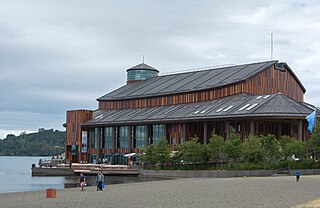Chilean music refers to all kinds of music developed in Chile, or by Chileans in other countries, from the arrival of the Spanish conquistadors to the modern day. It also includes the native pre-Columbian music from what is today Chilean territory.

Los Lagos Region is one of Chile's 16 regions, which are first order administrative divisions, and comprises four provinces: Chiloé, Llanquihue, Osorno and Palena. The region contains the country's second largest island, Chiloé, and the second largest lake, Llanquihue. Its capital is Puerto Montt; other important cities include Osorno, Castro, Ancud, and Puerto Varas. The mainland portion of Los Lagos Region south of Reloncaví Sound is considered part of Patagonia.
The music of Sicily is created by peoples from the isle of Sicily. It was shaped by the island's history, from the island's great presence as part of Magna Grecia 2,500 years ago, through various historical incarnations as a part of the Roman Empire, then as an independent state as the Emirate of Sicily then as an integral part of the Kingdom of Sicily and later the Kingdom of the Two Sicilies, and, finally, as an autonomous region of the modern nation state of Italy.

Frutillar is a city and commune located in southern Chile, Chilean Patagonia, in Llanquihue Province, within the Los Lagos Region, the lake district. The bay of Frutillar is placed on the banks of Lake Llanquihue, the largest lake entirely within Chile. Frutillar is known as the "City of Music", and since 2017 is part of the UNESCO Creative Cities Network (UCCN), becoming the first Chilean city to be nominated, as well as the southernmost Creative City of Music in the world.

Llanquihue Province is one of four provinces of the Chilean region of Los Lagos (X). Its capital is Puerto Montt. Chile's second largest lake, Lake Llanquihue, is located in the province as well as four volcanoes: Osorno, Calbuco, Puntiagudo and Cerro Tronador.

Puerto Varas, also known as "La Ciudad De Las Rosas" or “The City Of Roses”, is a city and commune located in the southern Chilean province of Llanquihue, in the Los Lagos Region.

Osorno Volcano is a 2,652-metre-tall (8,701 ft) conical stratovolcano lying between Osorno Province and Llanquihue Province in the Los Lagos Region of southern Chile. It stands on the southeastern shore of Llanquihue Lake, and also towers over Todos los Santos Lake. Osorno is considered a symbol of the local landscape and, as such, tends to be the referential element of the area in regards to tourism. By some definitions, it marks the northern boundary of Chilean Patagonia.

The Music of Emilia-Romagna has the reputation of being one of the richest in Europe; there are six music conservatories alone in the region, and the sheer number of other musical venues and activities is astounding. The region, as the name implies, combines the traditions of two different, contiguous areas—Emilia and Romagna—and it is perhaps this blend that contributes to the wealth of musical culture.
Beyond Florence, there are nine other provinces in the region of Tuscany, named for the largest city in, and capital of, the respective province. Taken together, they offer an intense musical life.
Puerto Octay is a town and commune in Osorno Province located on the north shore of Llanquihue Lake in Los Lagos Region in the south of Chile. It was settled by German colonists in 1852. Puerto Octay was an important port with regular traffic to Puerto Varas before the railway opened in 1912.
German Chileans are Chileans descended from German immigrants, about 30,000 of whom arrived in Chile between 1846 and 1914. Most of these were from Bavaria, Baden and the Rhineland, and also from Bohemia in present-day Czech Republic, which were traditionally Catholic. A smaller number of Lutherans immigrated to Chile following the failed revolutions of 1848.

Llanquihue is a Chilean commune and city in Llanquihue Province, Los Lagos Region. The city lies on the western shore of Lake Llanquihue, where the Maullín River starts. It is located 7 kilometres (4.3 mi) north of Puerto Varas and 19 kilometres (12 mi) south of Frutillar and is connected to both cities by Chile Highway 5.
Sean Eric Kennard is an American classical pianist.
Clifton Taylor is a theatrical Designer who is based in New York.

Los Huasos Quincheros are a popular Chilean folk musical group, first formed in 1937. It currently consists of the musicians Antonio Antoncich, Jose Vicente Leon and Rafael Prieto. The group was nominated for an International Music Prize in 1970.

Congreso is a musical band from Chile.

The Teatro del Lago is a stage theatre and concert hall located in Frutillar, Los Lagos Region, Chile.
From 1850 to 1875, some 30,000 German immigrants settled in the region around Valdivia, Osorno and Llanquihue in Southern Chile as part of a state-led colonization scheme. Some of these immigrants had left Europe in the aftermath of the German revolutions of 1848–49. They brought skills and assets as artisans, farmers and merchants to Chile, contributing to the nascent country's economic and industrial development.

The Lutheran Church in Chile is one of the two denominations of Lutheranism in Chile. It separated from the historical Evangelical Lutheran Church in Chile (IELCH) in 1975 due to differences in political perceptions of the pastors and bishops during the beginning of the military dictatorship led by Augusto Pinochet. It is a member of the Lutheran World Federation, which it joined in 1991. Most congregations are bilingual in German and Spanish.

Igor Pikayzen is a Russian-American violinist.















